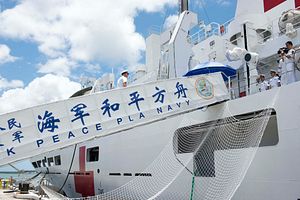On Thursday, Chinese President Xi Jinping (who is also the chairman of China’s Central Military Commission) said that China will place a greater emphasis on military diplomacy as a part of its overall foreign policy strategy. Xi made the comments at a meeting of military attaches and other military officials in charge of diplomatic work. Officers in attendance included Fan Changlong, vice chairman of the Central Military Commission; Xu Qiliang, another vice chairman as well as the head of China’s air force; Minister of Defense Chang Wanquan; Chief of PLA General Staff Fang Fenghui; and Wu Shengli, China’s naval chief.
Xi exhorted the military officers in attendance to “start a new phase of military diplomacy.” Xi noted that the CCP has always viewed military diplomacy as an important tool for advancing China’s overall diplomatic goals, safeguarding national security, and promoting the construction of China’s military. Today, military diplomacy is even more prominent in China’s national diplomacy and security strategy, Xi said.
China’s emphasis on military diplomacy was evidenced last year, as China stepped up military exchanges, visits, and joint drills. A spokesman from the Defense Ministry recapped China’s 2014 military diplomacy in the final press conference of the year. According to the spokesman, Yang Yujun, China participated in 31 bilateral or multilateral joint exercises. Notably, Yang said, the focus of the exercises “expanded from non-traditional security to traditional security.” Exercises in 2014 were “more real combat oriented” than in the past, Yang added.
Last year China was also extremely active in sending military officials overseas or hosting their foreign counterparts. As The Diplomat reported, in the space of two weeks in July 2014, Chinese military officials held meetings with officers from the U.S., Australia, New Zealand, South Korea, and Indonesia. China is already off to an active start when it comes to military exchanges, as a group of PLA Navy ships is making the rounds in Europe.
Finally, 2014 was a bumper year in terms of China’s military engagement on more humanitarian missions, from the fight against Ebola to efforts to track down missing Malaysia Airlines flight 370. China also dispatched its first-ever battalion of troops to join a U.N. peacekeeping mission.
What does China hope to accomplish through its increased emphasis on military diplomacy? As Robert Farley noted in an earlier piece for The Diplomat, there are a number of possible gains: providing intelligence about foreign military organizations; creating personal relationships with other military personnel; and displaying China’s own military power.
Chinese discussion of military diplomacy certainly includes an element of deterrence. While advocating for greater military diplomacy, Xi also urged officers to “make a new, larger contribution toward realizing the Chinese dream and the dream of a strong military.” In describing the results of China’s 30-plus joint military drill, Defense Ministry spokesman Yang Yujun said the exercises “boosted mutual trust, deepened cooperation and improved skills. At the same time, the Chinese military gained the opportunity to demonstrate our fine image on the international stage.”
Perhaps even more important to China than demonstrating its military might is the drive to become a military leader – not only technologically but ideologically. In other words, China’s military diplomacy is the natural consequence of Beijing’s growing wish to play a leadership role on the world stage, including in military discussions. A CCTV news segment on China’s military diplomacy highlighted that the military was taking a more active role in shaping discussions rather than passively reacting to criticism as had been typical in the past.
For China’s military diplomacy, this sort of agenda-setting is a goal of equal importance with simple displays of ability. That’s why China is attempting to elevate its Xiangshan Forum into a rival for the annual Shangri-La Dialogue as a premier platform for discussing regional security issues – and why the new, improved Xiangshan Forum made it on a Xinhua list of 10 “breakthroughs” in military diplomacy in 2014. Greater military diplomacy is a key part of Xi Jinping’s new vision for “great power diplomacy with Chinese characteristics.”
There’s one other goal for China’s military diplomacy, one that combines the functions of military displays and agenda-setting – counteracting the “China threat” narrative and providing reassurance about the ambitions and policies of the Chinese military. It may seem counterintuitive that China wants to use military diplomacy to quell fears. After all, a port visit to Sri Lanka by a Chinese submarine set off an avalanche of discussion about China’s military ambitions in the Indian Ocean — hardly reassuring, at least to Indian observers.
But China hopes that eventually, by opening its military up to outside contacts, it can convince its neighbors (and potential rivals) that it is sincere in talking about a “peaceful rise.” China’s military diplomacy is not only about defending national security, but about sending “envoys of peace,” Xinhua declared in a December 2014 article. “This year, China’s periphery was definitely not peaceful. China’s military diplomacy made greater efforts to use peaceful methods to insist on its positions and dissolve crises,” the article explains. In other words, China wants to use military diplomacy to solve crises without having to resort to military force. Talks with the U.S. on “codes of conduct” and with Japan on setting up a maritime consultative mechanism attest to this desire. China also hopes that, by simply fostering connections with other militaries, it can convince the world that its military is not a boogeyman to be feared. Humanitarian missions are especially useful in this regard.
Of the three main goals China has for its military diplomacy — deterrence, agenda-setting, and reassurance — it’s the last that has proved least successful thus far. China’s military forays into faraway lands tend to spark even more breathless analysis of China’s military ambitions rather than convincing the world of China’s peaceful intentions. But as such visits become the norm rather than new (and thus potentially threatening) tours abroad, we may see China begin to reap the benefits of cooperative engagement.

































